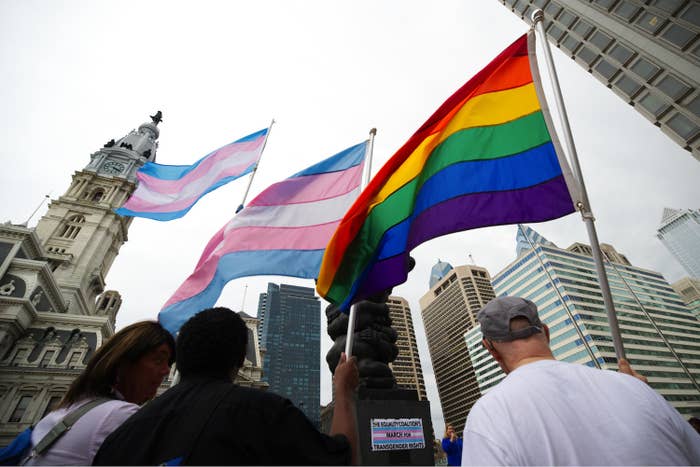
More LGBT people have been killed in what advocacy groups categorize as hate-violence-related homicides so far in 2017 than in all of 2016, according to data from an LGBT rights organization.
As of August 2017, there have been 33 hate-violence-related homicides of LGBT people, according to the National Coalition of Anti-Violence Programs' count. In 2016, there were 28 — that number excludes the 49 people killed in the Pulse nightclub shooting in Orlando.
The numbers translate to roughly one hate-violence-related death every 13 days in 2016. So far in 2017, the pace of those deaths is at about one every six days.
Fifteen of those who were killed in 2017 were transgender women of color, and at least 12 were cisgender gay men. The reports came from all over the US, from Texas to New York to Wisconsin.
The NCAVP said that there’s no one clear explanation for the increase, but that it could be driven by a combination of increased media reporting, more accurate identification of victims by law enforcement, and a possible increase in violence. Increased media attention to LGBT rights — and particularly transgender rights — in recent months could also be part of the explanation.
"I think whether it’s an increase in reporting, an increase in violence, or some combination thereof, it should be a wake-up call for us across our communities that hate violence is not going away, it’s certainly not decreasing, and it’s symptomatic of larger and deeper problems in our society that we still haven’t addressed," Beverly Tillery, executive director at the New York City Anti-Violence Project, told BuzzFeed News. Her group coordinates with the NCAVP and is the lead agency that puts together the violence report.
“It should be a wake-up call for us across our communities that hate violence is not going away."
The NCAVP's tally is not definitive, but it's the most comprehensive yearly indicator — in the absence of reliable nationwide government data — of how many homicides of LGBT people are being reported around the country. The organization gathers data from media reports, friends and family members of victims, and member organizations across the country.
They categorize homicides as "hate violence" if it appears that the victim was targeted because of their gender identity or sexual orientation. That doesn't necessarily mean the cases were classified as hate crimes by law enforcement, which has a different set of legal standards.
Dallas Drake, senior researcher at the Center for Homicide Research, says that the rate of homicides of trans women and gay men are worth studying, but that there's no way of knowing if these figures represent an actual increase in violence. Either way, he said, the NCAVP is likely undercounting the real number.
"There are a lot more homicides of LGBT people than what they report," Drake said. "They don't report generally from communities that are smaller or where cases are not easily identifiable as LGBT homicides."
Vanessa Panfil, an assistant professor of sociology and criminal justice at Old Dominion University in Virginia, said that an increase in violence is in line with a real backlash against progress made on LGBT rights in recent years.
That backlash, she says, has been encouraged in part by the Trump administration walking back Obama-era guidances and policies that were LGBT-inclusive, such as supporting trans students' rights and signaling a ban on allowing trans people to serve in the military. As a result, transgender people across the country are relying on courts to decide if they’re allowed to access bathrooms in line with their gender identities — a decision the Supreme Court decided not to weigh in on when it sent a landmark trans rights case back to a lower court earlier this year. On the state level, transgender “bathroom bills” aren’t gaining much traction since the defeat of North Carolina’s HB2 — but some state legislatures are now considering bills that would prevent cities and local councils from having nondiscrimination ordinances.
The increase in violence could be "influenced by heterosexism, transphobia, and homophobia that have always existed but now partly fueled by backlash,” said Panfil, who studies hate crimes against LGBT people.

Two of the trans women of color killed this year were in New Orleans. Chyna Gibson, 31, was shot and killed outside a shopping mall, and Ciara McElveen, 25, was stabbed to death in the city's 7th Ward. The incidents were unrelated.
Gibson, who grew up in New Orleans but lived in Sacramento, was in the city to celebrate Mardi Gras, friends told the Times-Picayune in March. She was gunned down on a Saturday in February outside the Bella Plaza shopping center, where she’d gone to pick up a dress for a party that night.

She was a well-known performer on the drag scene nationally, where she went by the stage name Chyna Doll Dupree. "It's a shocker to everyone because she didn't have any drama with anyone, and I've never heard her say she was into something,” Dayshawn Brown, a friend of Dupree’s, told the paper.
The following Monday morning, Ciara McElveen was stabbed several times and found on a sidewalk. The Times-Picayune reported that a witness told police he saw a man driving a black car, with McElveen riding in the passenger seat, pull over to the side of the road. The man then took something out of the trunk of the car, went around to the passenger’s side, and stabbed McElveen, before dragging her out of the car and slamming her head into the pavement. He then drove away.
“She was outgoing... and she had a good head on her shoulders," a friend of McElveen’s, named Ayrielle, told the paper at a vigil a few days later. "Justice needs to be served."
The New Orleans Police Department said they are investigating Gibson's murder as a hate crime, but not McElveen's. They say the determination is ultimately made by the FBI after local authorities refer the case to them (hate crime laws in Louisiana and 12 other states cover sexual orientation, but not gender identity). The Orleans Parish District Attorney’s office didn’t immediately respond to a request for comment.
Sgt. Frank Robertson, the New Orleans Police Department's LGBT liaison, said that in the two years he's been in his role, he feels he's made progress on improving the relationship between police and LGBT residents of the city.
"The challenges that we do face with members of the trans and gay community is that members are reluctant to come and speak to us for obvious reasons that they’re either afraid or they don't trust the police," Robertson said.
CoBella Monroe, 20, an advocate at the New Orleans trans activist group BreakOUT, told BuzzFeed News that without antidiscrimination protections, many trans and gender-nonconforming people nationally are left without the protections that come with having a steady income and place to live.
"We have to make sure that our community has resources so those numbers go down so that people aren’t being harassed and attacked on the streets," she said.
Across the US, 28 states have no housing or employment laws specifically protecting LGBT people from discrimination. Two other states, Wisconsin and New Hampshire, have those protections, but only for sexual orientation, not gender identity.

In another case in March this year, Andrew Nesbitt was stabbed to death in his apartment in Madison, Wisconsin. It was the day of his 46th birthday.
Nesbitt had been out celebrating his birthday with friends at a local bar the evening before, the Wisconsin State Journal reported, and it’s not clear how he met the man charged with his murder. Nesbitt’s roommate found him dead, with multiple stab wounds, in their apartment the morning after his birthday party.
Darrick E. Anderson, 23, was charged with first-degree homicide after a blood sample found in Nesbitt’s kitchen matched his own.
Nesbitt's killing is not currently being investigated as a hate crime. The Madison Police Department and Dane County District Attorney’s Office didn’t immediately return a request for comment.
Kathy Flores, an LGBTQ anti-violence program manager for the Wisconsin advocacy group Diverse & Resilient, knew Nesbitt well — she first met him after he was attacked and severely injured in a hate crime outside a gay bar in 2011.
"I work with a number of survivors who have been attacked in their homes, outside their workplaces, in and outside of LGBTQ bars, in parks downtown, things like that. The message this sends to LGBTQ folks is clear: that we may not be safe anywhere," she said.
She says the value of a tally like the NCAVP's is that it draws attention to killings that may not fit the strict legal definition of "hate crime" but where it's anecdotally clear that the victim died because they were targeted for their sexual orientation or gender identity.
"I think the distinction is different for advocates than it might be by the legal definition," she said, giving an example of a bartender in Milwaukee who was killed after leaving a gay bar earlier this year, whose case was not treated as a hate crime. "The intent may have been robbery but the victimization could have been related to the fact that he was gay and seen coming out of an LGBTQ establishment. So I think the targeting definitely does have hate and homophobia bias."
